International Research Landscape
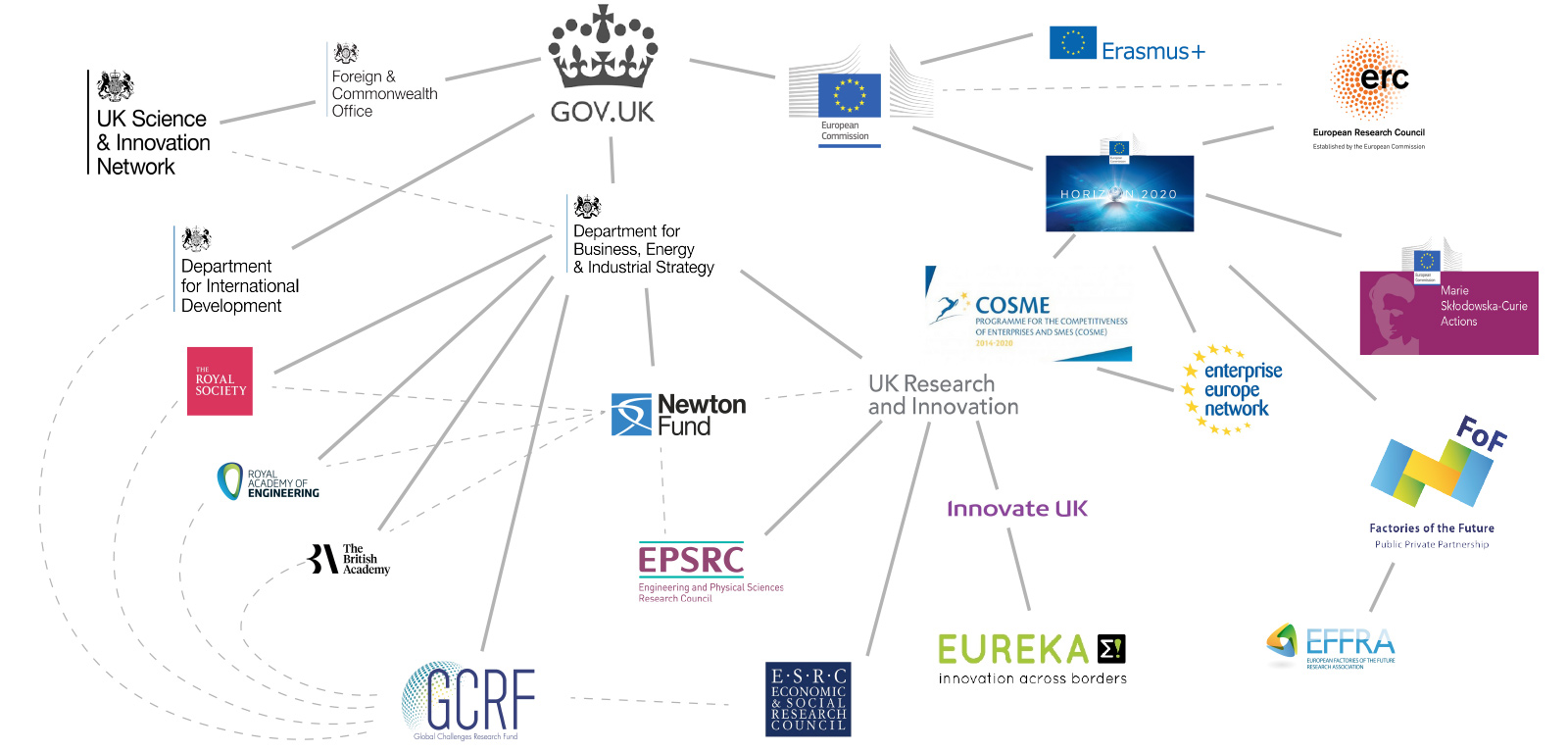
Governments around the world have established complex, sophisticated and interconnected research infrastructures. They have a common purpose - improve and protect their societies, and provide the tools whereby they can survive and thrive in turbulent global markets.
Through our Centre for Intelligent Autonomous Manufacturing Systems (i-AMS) in Queen’s University we make a difference through multiple symbiotic relationships with colleagues around the world.
We work with researchers in our trading partner countries to ensue reservoirs of engineering competence, capability and capacity increase, and sustain a flow of innovations to manufacturing industry. We are aware that colleagues in developing countries need to tackle peculiar challenges they face in manufacturing, and we provide access to the resources and knowledge they need.
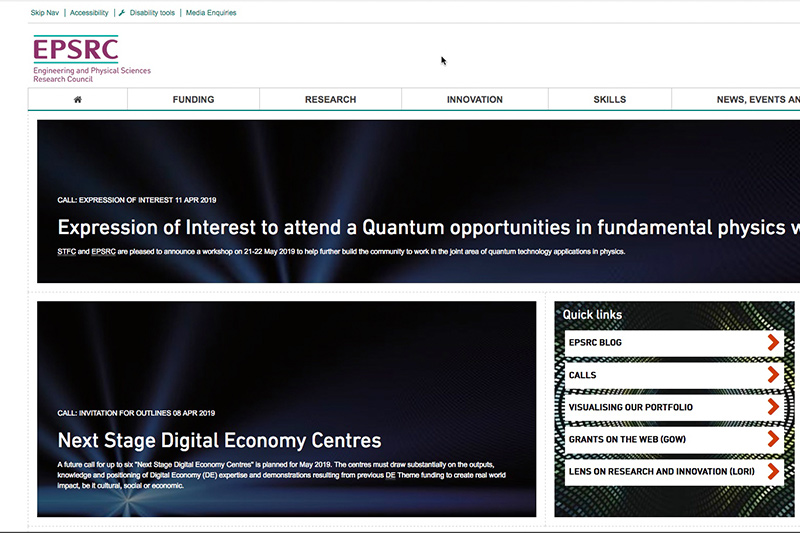
The EPSRC encourages researchers to get out into the world, establish contact with the best, build relationships, create world class R&D joint ventures, and deliver.
China, India, Japan and the USA - preferred partners
The EPSRC supports international collaboration with partners [1], particularly in China, India, Japan and the USA, because they are historically strong in engineering and the physical and mathematical sciences, or else they are rapidly growing their capabilities (sic) in EPSRC research areas. The grants, which are typically to support travel costs, can be configured to match the needs of a potential opportunity. Researchers are advised to consult with relevant EPSRC Theme Leads, and the local Research Council offices established in China, India and USA to facilitate collaborative initiatives.
UK/Ireland - cross border collaborations
A collaboration agreement has been made between the EPSRC and the Science Foundation Ireland (SFI) [2] with the purpose to encourage and support applications that cut across national boundaries involving collaborative teams led by researchers from the UK and Ireland. The EPSRC will accept joint applications for grants at any time; however, the first step is for the partners to prepare an “Expression of Interest” submission. If a submission complies with the eligibility requirements, and falls within the remit of the EPSRC and SFI, and has merit, the partners will be invited to submit a full proposal.
References
[1] EPSRC. “EPSRC funding for International collaboration”. [online]. Available at <https://epsrc.ukri.org/funding/applicationprocess/routes/international/>
[2] EPSRC. “Lead agency agreement with Science Foundation Ireland”. [Online]. Available at <https://epsrc.ukri.org/about/partner/international/agreements/sfireland/>
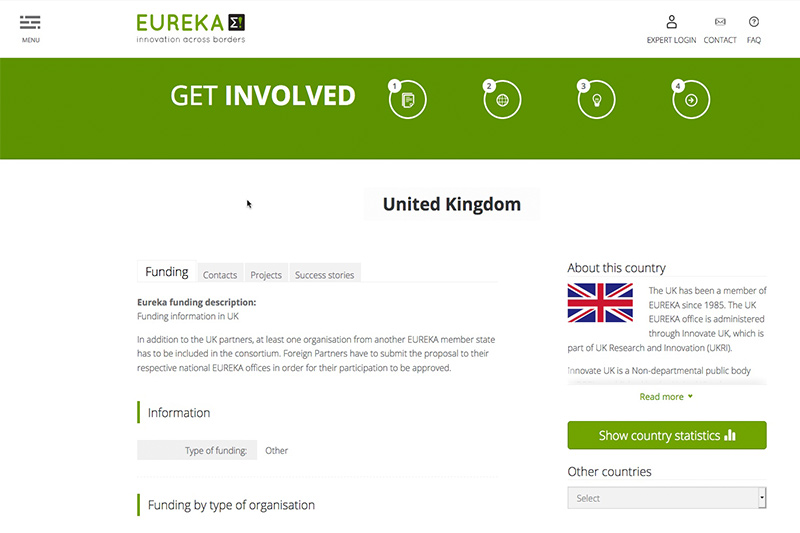
"Our mission is to enable businesses and research organisations to innovate with the best partners, regardless of where these partners are in the world". Tim Bestwick, EUREKA Chair, 2018/2019
EUREKA [1] is not a research programme, rather it is an intergovernmental organisation for funding and coordination. EU Member States are full members, Canada, Chile, and South Africa are associate members and South Korea is a partner. Innovate UK is responsible for EUREKA in the UK.
EUREKA maintains a number of initiatives, programmes and lines of development designed to draw together people in business and a research organisation with common interests, i.e., Clusters, Network Projects, and the UK drives specific bi-lateral initiatives, e.g., UK/Canada, UK/South Korea, etc.
EUREKA Clusters
Clusters [2] are long-term and strategically significant initiatives that develop technologies of key importance for European competitiveness. Addressing the needs of both large companies and SMEs, they are the engine for industrial innovation and economic growth.
SMART; advanced manufacturing - define, perform and fund collaborative, international and close-to-market research, development and innovation projects among large companies, SMEs, associations, RTOs & Academia.
PENTA; catalyse research, development and innovation (RD&I) in areas of micro and nanoelectronics enabled systems and applications.
METALLURGY Europe; design and discover the next-generation alloys, intermetallics, compounds and composites that can be processed into higher-performance metallic components for industrial end-users.
CELTIC-NEXT; focusing on Next Generation Telecommunications for the Digital Society supporting projects in all relevant ICT areas.
EURIPIDES²; promotes the generation of innovative, industry-driven, pre-competitive R&D projects in the area of Smart Electronic Systems, e.g., smart sensors, smart power modules, electronic hardware platforms, etc.
EUROGIA2020; supports and promotes transnational, low carbon energy technology projects, and covers the entire energy mix from all forms of primary energy sources (except nuclear).
ITEA3; research, development and innovation programme for software innovation projects in a global community of large industry, small and medium-sized enterprises (SMEs), start-ups, academia and customer organisations.
EUREKA Network Projects
Network Projects are transnational, market-driven innovative research and development projects. Project consortia, i.e., at least two partners from two different countries, have an open invitation to define the nature of the technologies to be developed and describe how a project comes together, agree upon the intellectual property rights and build a collaborative team, to share expertise and ease access to international markets with the results of their research.
Eurostars
The purpose of the Eurostar Programme is to support research and development in SMEs, and in the context of international collaboration. The programme is funded by 36 Eurostars countries and by the European Union through Horizon 2020.
"With its bottom-up approach, it stimulates international collaborative research and innovation projects that will be rapidly commercialised. Participation in a Eurostars project can become a passport to growth, further innovation, an opening to new global markets and even greater business success."[3]
The countries participating in Eurostars through the EUREKA network of national offices are: Austria, Belgium, Bulgaria, Canada, Croatia, Cyprus, Czech Republic, Denmark, Estonia, Finland, France, Germany, Greece, Hungary, Iceland, Ireland, Israel, Italy, Latvia, Lithuania, Luxembourg, Malta, the Netherlands, Norway, Poland, Portugal, Romania, Slovak Republic, Slovenia, Spain, South Africa, South Korea, Sweden, Switzerland, Turkey, United Kingdom.
References
[1] EUREKA. "What is EUREKA". [online]. Available at <https://www.eurekanetwork.org/>
[2] EUREKA Clusters. “What is a EUREKA Cluster”. [online]. Available at <https://www.eurekanetwork.org/eureka-clusters>
[3] Eurostar Programme. [online]. Available at <https://www.eurostars-eureka.eu/about-eurostars>
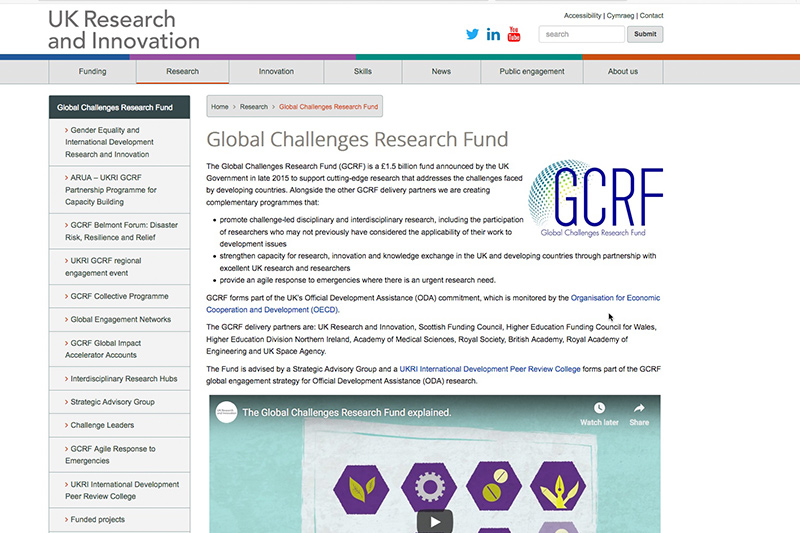
“...ensure UK science takes the lead in addressing the problems faced by developing countries, whilst developing our ability to deliver cutting-edge research” [1]
The GCRF [2] purpose is to support UK research organisations as they develop solutions that address the most significant and complex problems faced by developing countries, at the same time strengthen their research capability, and build long term partnerships with fellow researchers. GCRF funding is awarded in accordance with the OECD ODA guidelines [3], and aligns with the UN Sustainable Development Goals (SDG).
The GCRF has an overarching framework with three themes; 1. equitable access to sustainable development; 2. sustainable economies and societies; 3. human rights, good governance and social justice. The focus for Queen's University's centre for Intelligent Autonomous Manufacturing Systems (i-AMS) is on the second theme, i.e., sustainable economies and societies, and specifically the element within the theme which calls for sustainable production and consumption of materials and other resources.
The i-AMS team is keen to work in partnership with UK researchers, and researchers in developing countries, and contribute our expertise and knowledge in sensing, data analysis, simulation and automation to build and improve production systems, and ensure the efficient use of resources.
References
[1] Department for International Development. “UK aid: tackling global challenges in the national interest”. Cited in “UK Strategy for the Global Challenges Research Fund (GCRF)”. Available at <https://www.ukri.org/files/legacy/research/gcrf-strategy-june-2017/>
[2] UKRI. "Global Challenges Research Fund". [online]. Available at <https://www.ukri.org/what-we-do/browse-our-areas-of-investment-and-support/global-challenges-research-fund/>
[3] OECD. “DAC List of ODA Recipients”. [online]. Available at <http://www.oecd.org/dac/financing-sustainable-development/development-finance-standards/daclist.htm>
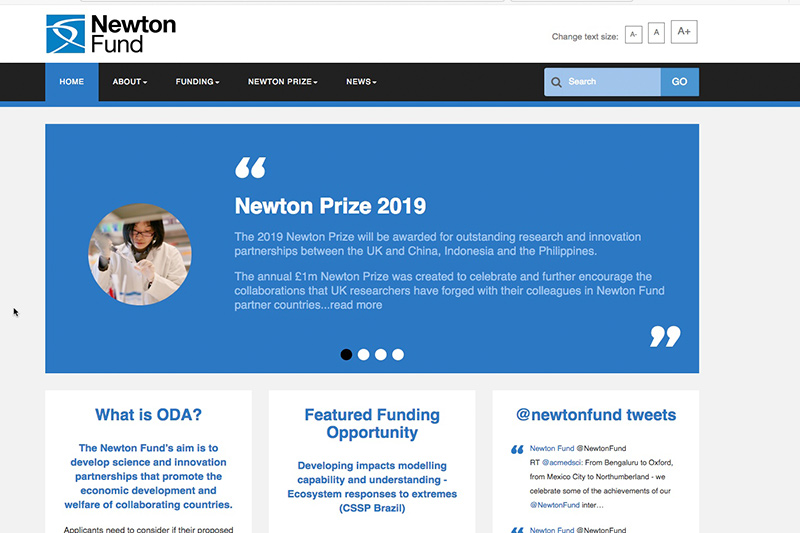
"…reduce poverty by generating, and putting into use, knowledge and technology to address development challenges and advance development for the poorest people and countries" [1]
The UK’s Newton Fund has an international perspective and provides financial support to researchers from across the world who wish to work with the UK towards a primary objective.
Researchers come from partnering countries on the DAC List of ODA Recipients [2], and three programmes are relevant to those engaged in manufacturing research.
Newton International Fellowships
The scheme provides the opportunity for the best early stage post-doctoral researchers from all over the world to work at UK research institutions, such as Queen’s University Belfast, for a period of two years. The Royal Society [3] runs the programme in regard to the natural and physical sciences, chemistry, engineering, mathematics and physics.
Newton Mobility Grants
The Royal Society is responsible for the administration of mobility grants [4] for which international researchers who have a PhD, or equivalent research experience, can apply. The grants contribute to the cost of travel for researchers who wish to strengthen their research and innovation capacity by visiting the UK to engage with research institutions such as Queen’s University Belfast. Such visits might well be the predecessor to an application for a Newton International Fellowship (see above).
Leaders in Innovation Fellowships (LIF)
The Royal Academy of Engineering runs the LIF programme [5], which aims to build the entrepreneurial capacity and commercialisation skills of innovators in partner countries. The programme is divided into two parts; participants have a two-week residential training bootcamp in London complemented by a bespoke follow-on support package upon their return to their home country.
References
[1] Newton Fund. “About; Newton Fund”. [online]. Available at <https://www.newtonfund.ac.uk/about/>
[2] OECD. “DAC List of ODA Recipients”. [online]. Available at <http://www.oecd.org/dac/financing-sustainable-development/development-finance-standards/daclist.htm>
[3] The Royal Society. “Newton International Fellowships”. [online]. Available at <https://royalsociety.org/grants-schemes-awards/grants/newton-international/>
[4] The Royal Society. “Newton Mobility Grants”. [online]. Available at <https://royalsociety.org/grants-schemes-awards/grants/newton-mobility-grants/>
[5] Royal Academy of Engineering. “Leaders in Innovation Fellowships”. [online]. Available at <https://www.raeng.org.uk/grants-and-prizes/grants/international-research-and-collaborations/newton-fund-programmes/leaders-in-innovation-fellowships>
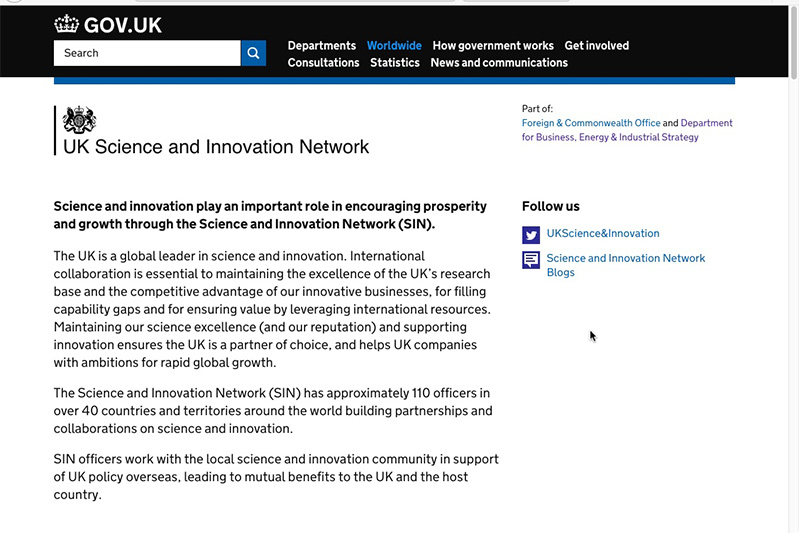
"International collaboration is essential to maintaining the excellence of the UK’s research base and the competitive advantage of our innovative businesses, for filling capability gaps and for ensuring value by leveraging international resources...the UK is a partner of choice, and SIN helps UK companies with ambitions for rapid global growth...mutual benefits to the UK and the host country."
SIN has eleven (11) thematic programmes [1] that are advanced in partner countries to through plans that address four (4) global objectives.
- Prosperity – enhancing UK growth and exports; connecting innovative UK industries and scientific expertise with international opportunities
- Security – delivering solutions to global challenges such as anti-microbial resistance (AMR), health, energy, the conservation and sustainable use of oceans, and enhancing resilience to natural disasters
- Influence – strengthening the UK’s foreign policy influence through science and innovation
- Development – supporting international development goals and matching UK expertise to international need
References
[1] UK Science and Innovation Network. Availabel at <https://www.gov.uk/world/organisations/uk-science-and-innovation-network>
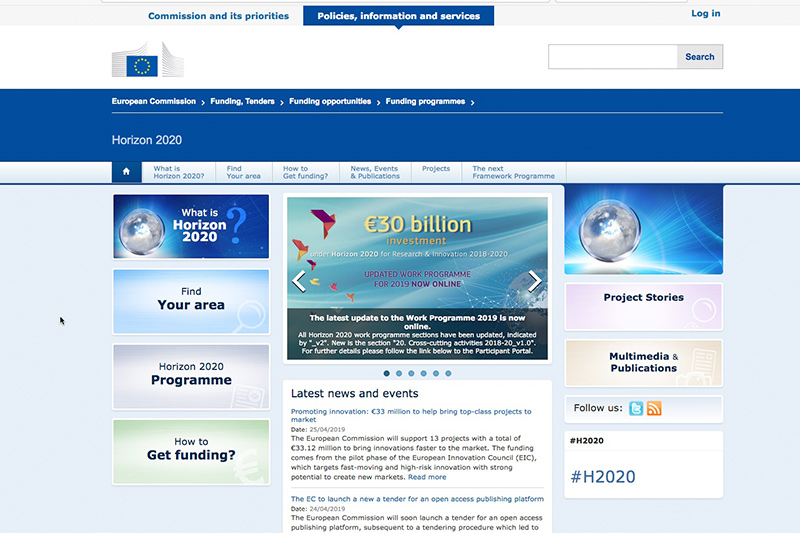
"Horizon 2020...flagship initiative aimed at securing Europe's global competitiveness...drive economic growth and create jobs... EU’s blueprint for smart, sustainable and inclusive growth and jobs...emphasis on excellent science, industrial leadership and tackling societal challenges." [1]
Horizon 2020
The framework has three priorities, i.e., excellent science, industrial leadership and societal challenges, and these headings are expanded below. For an overview of the programme structure, and some key elements relevant to manufacture please pick this link <H2020 structure>.
Priority 1; Excellent science - Europe needs:-
- world class science on which to build foundation for tomorrow's technologies, jobs and wellbeing
- to develop, attract and retain research talent
- the best infrastructures to facilitate and enable researchers
Priority 2; Industrial leadership - Europe needs:-
- strategic investment in key technologies to underpin innovation across existing and emerging sectors
- to attract more private investment in research and innovation
- more innovative small and medium-sized enterprises (SMEs) to create growth and jobs
Priority 3; Societal challenges - Europe needs:-
- the EU policy objectives for citizens and society cannot be achieved without innovation
- breakthrough solutions from multi-disciplinary collaborations that included social sciences and humanities
- to test and demonstrate solution and scale them up
Horizon Europe
A new framework with the title "Horizon Europe" [2] has been adopted by the European Commission, and once the European Council and Parliament have negotiated and adopted the framework it will be implemented from 2021 to 2027, supported with a €100bn budget. The strategy will adopt a "mission-oriented" approach, i.e., setting defined goals, with specific targets and working to achieve them in a set time. The approach has been influenced by Professor Mariana Mazzucato, University College London, who recommends [3] the criteria for selecting missions should be:-
- bold, inspirational, with wide societal relevance
- clear direction; targeted, measurable and time bound
- ambitious but realistic research innovation actions
- cross-disciplinary, cross-sectoral and cross-actor innovation
- multiple, bottom-up solutions.
References:-
[1] What is Horizon 2020. Available at <https://ec.europa.eu/programmes/horizon2020/en/what-horizon-2020>
[2] Horizon Europe (2018). Available at <https://ec.europa.eu/info/horizon-europe-next-research-and-innovation-framework-programme_en#timeline>
[3] Mazzucato, M. (2018). "Mission-Oriented Research and Innovation In the European Union". [online]. Available at <https://ec.europa.eu/info/sites/info/files/mission-oriented-research-innovation-policy-presentation_2018_en.pdf